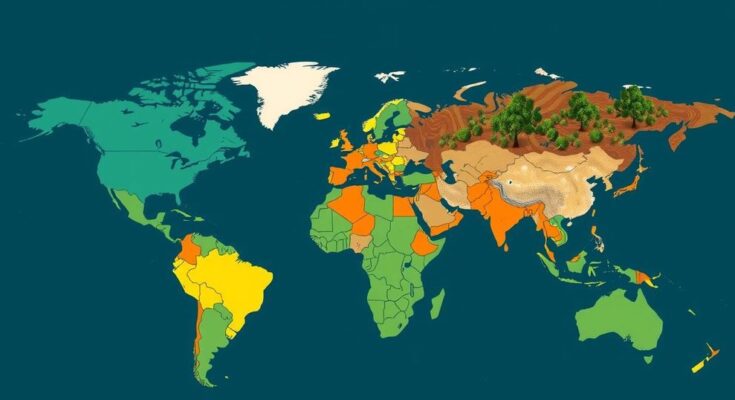Wealthier nations have begun to provide financial compensation for climate damage to poorer countries, exemplified by the case of Malawi’s Christopher Bingala after Cyclone Freddy. Approximately $720 million has been pledged, but climate experts warn that this may fall short in addressing the growing needs driven by climate-related disasters. The ongoing COP29 summit is focusing on establishing guidelines for this funding as the demand continues to rise with increasing climate threats.
Recent developments indicate that wealthier nations are beginning to provide financial compensation to poorer countries adversely affected by climate change. A striking example is that of Christopher Bingala, a subsistence farmer in Malawi, who lost his home and livestock due to Cyclone Freddy. Bingala’s situation improved after receiving a payment of approximately $750, which was part of a new funding initiative aimed at covering damages associated with climate-related disasters. This pilot program falls under a broader effort where affluent nations are committing financial resources to aid struggling nations significantly impacted by extreme weather events, despite minimal contributions to global emissions.
As the toll from climate phenomena such as floods and storms amplifies, developing countries are escalating their demands for financial support. Approximately $720 million has been pledged by nations like the United States and members of the European Union. However, experts caution that these funds will not meet the growing needs, considering the intensifying frequency and magnitude of climate disasters. During the ongoing COP29 climate summit in Baku, discussions are underway concerning the extent of compensation owed to nations grappling with climate upheaval.
The impacts of Cyclone Freddy were catastrophic, resulting in the displacement of over 650,000 individuals across Malawi. Bingala’s family faced severe food shortages after their home was destroyed, leading them to the bleak circumstance of scavenging meat from deceased animals caught in the cyclone. Fortunately, the cash assistance enabled Bingala to relocate and rebuild, enhancing his family’s living conditions.
The pioneering funding initiative is primarily backed by the Scottish government, marking a significant step in formally addressing climate-induced damages. The funds, distributed by GiveDirectly, a non-profit organization, have reached approximately 2,700 families in Malawi, demonstrating a direct approach to alleviate the burdens on those most vulnerable.
Louise Wright, vice president at GiveDirectly, emphasized the limited safety nets available to impoverished households in low-income nations, stating that many lack access to basic insurance options. The program serves as a model for more extensive future funding arrangements as countries recognize the disparities in environmental responsibilities and their consequences.
The need for loss and damage funding is projected to escalate significantly, with recent estimates suggesting a financial requirement of $250 billion annually by 2030. Prime Minister Philip Davis of the Bahamas articulated the urgent necessity for increased contributions from wealthier nations, emphasizing the interconnectedness of humanitarian challenges, as many of these disasters create cross-border implications.
Climate change disproportionately affects poorer nations that historically have contributed minimally to global greenhouse gas emissions. These countries face increasingly severe weather patterns, including hurricanes, floods, and droughts, compromising their agricultural economies and displacing populations. The emergence of loss and damage funding signifies an acknowledgment by affluent countries of their role in exacerbating climate issues, facilitating a mechanism to provide financial redress to vulnerable communities. The funding initiatives are crucial not only for immediate disaster recovery but also for long-term adaptation and resilience-building efforts in these nations.
In conclusion, the shift towards compensating developing nations for climate-related damages marks a crucial step in addressing the inequities fostered by decades of industrialization in wealthier nations. While initial pledges of $720 million represent a commendable start, the response necessitates a substantial increase in contributions to adequately support the escalating humanitarian crises driven by climate change. This funding is imperative for not only restoring livelihoods but also ensuring the long-term viability of communities affected by extreme weather events.
Original Source: www.wypr.org




